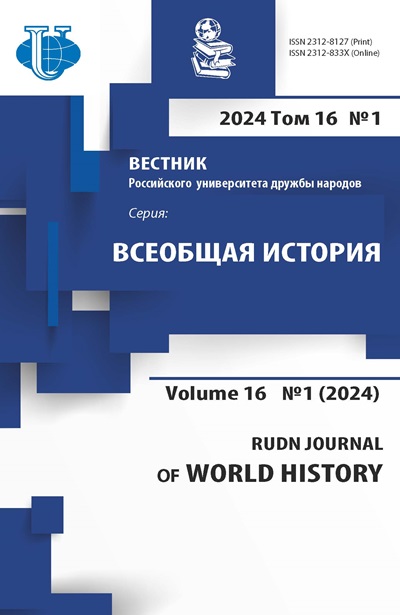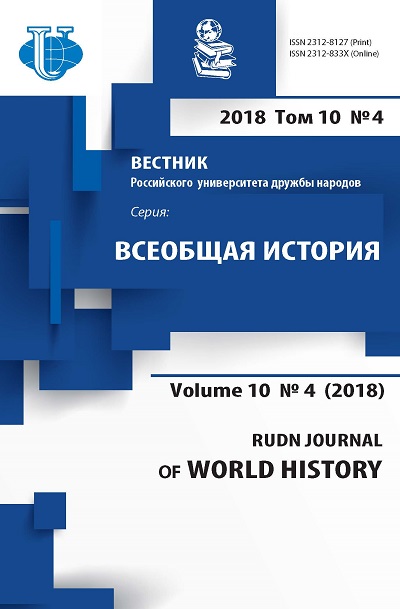Models of Egypt’s self-identifi cation in the interwar period (1919-1939)
- Authors: Ibragimov I.E.1, Kudelin A.A.2
-
Affiliations:
- Institute of Africa Russian Academy of Sciences
- Peoples’ Friendship University of Russia (RUDN University)
- Issue: Vol 10, No 4 (2018)
- Pages: 355-370
- Section: Oriental Studies
- URL: https://journals.rudn.ru/world-history/article/view/20728
- DOI: https://doi.org/10.22363/2312-8127-2018-10-4-355-370
Cite item
Full Text
Abstract
In the article, the authors consider the models of self-identification typical for the public thought of Egypt of the interwar period. In the fi rst half of XX century Egypt entered an important period of its history. As one of the fi rst formally independent Arab States, Egypt continued to struggle for full sovereignty from the United Kingdom while seeking to establish itself as a regional leader. In this regard, the leading thinkers of Egypt tried to determine the place of their country in the world and fi nd the most acceptable ideology for it, which could also rally other Arab, Muslim, Asian and African countries around Egypt. The article touched upon four concepts that were developed during the interwar period and infl uenced the further development of public thought in Egypt. Some thinkers have tried to develop a model of secular pan-Arabism based on the ideas of al-Kawakibi and al-Husri. For these authors, Egypt was an integral part of the Arab world and the core of its possible unifi cation. The second concept was related to pan-Islamism: developing the ideas of al-Afghani, the ideologues of this direction interpreted Egypt primarily as a Muslim country and part of the Dar al-Islam . For example, “Muslim Brotherhood” belonged to this group. The third concept is associated with the comprehension of the identity of Egypt through the idea of “pharaonism” and “ tamsir ” modern Egyptians declared heirs of the ancient Egyptian civilization. The fourth concept, conventionally named Eastern Idea or Easternism , was founded on the opposition of all the countries of the East to Western countries. Each of the areas of identity of Egypt - pan-Arab, pan-Islamic, Egyptian (“pharaonism”) and Easternism - made a contribution to the development of the identity of Egyptian society in the interwar period, and somehow infl uenced on the history of Egypt in the second half of the XX century.
Keywords
About the authors
Ibragim Eminovich Ibragimov
Institute of Africa Russian Academy of Sciences
Author for correspondence.
Email: ibragim07_93@mail.ru
postgraduate student, Institute of African Studies, Russian Academy of Sciences
30/1 Spiridonovka St., Moscow, 123001, RussiaAndrey Aleksandrovich Kudelin
Peoples’ Friendship University of Russia (RUDN University)
Email: kudelin_aa@rudn.university
PhD in History, Department of World History, Faculty of Humanities and Social Sciences
10-2 Miklukho-Maklaya St., Moscow, 117198, RussiaReferences
- [Al-Afgani. Dzhamal ad-Din]. Khatarat al-Afgani – ara’ ua afkar. Al-Kakhira, 2002.
- Al-Kavakibi. Abd ar-Rakhman. Priroda despotizma i gibelnost poraboshcheniya. M., 1964.
- Al-Khakim. Taufi k. ‘Audat ar-rukh. Al-Kakhira. [b.g.].
- Al-Khusri. Sati‘. Ma khiya al-kaumiyya? URL: https://docs.google.com/fi le/d/0B1hVH p4YpIKoZ1IyWjl6aHkzYUk/edit?pli=1.
- Ar-Rafi ‘i. ‘Abd ar-Rakhman. Mustafa Kamil: ba‘is al-kharaka al-vataniyya. Al-Kakhira, 1984.
- Ash-Shafi i Sh.A. Razvitiye natsionalno-osvoboditelnogo dvizheniya v Egipte (1882– 1956). M., 1961.
- Badaui N.M. Kudelin A.A. Vliyaniye arabskogo Vozrozhdeniya (an-Nakhda) na ideologiyu «Bratyev-musulman» // Vestnik RUDN. Seriya: Vseobshchaya istoriya. 2017. T. 9. № 1. S. 53–66.
- Belolipetskaya N.A. Britanskoye vospriyatiye Egipta v kontse XIX – nachale KhKh v.: osnovnyye stereotipy // Analitika kulturologii. № 13 (2009). S. 1–6.
- Belolipetskaya N.A. Formirovaniye natsionalnoy idei v Egipte i eye vospriyatiye anglichanami (1882–1923 gg.) // Vestnik Chelyabinskogo gos. un-ta. № 24 (2008). S. 125–135.
- Gazal. Mustafa Fauzi ibn ‘Abd al-Latif. Da‘uat Dzhamal ad-Din al-Afgani fi mayzan al-islam. Ar-Riyad, 1983.
- Kamikha. Dzhabir. Tamsir al-luga. URL: http://www.alukah.net/literature_language/0/ 78720/#_ftn1.
- Kudelin A.A., Kadyrova K.A., Lukashev A.A. Dzhikhad mnogolikiy. SPb., 2015.
- Kirillina S.A. Islam v obshchestvennoy zhizni Egipta (vtoraya polovina XIX– nachalo XX v.). M., 1989.
- Levin Z.I. Islam i natsionalizm v stranakh zarubezhnogo Vostoka: ideynyy aspekt. M., 1988.
- Levin Z.I. Razvitiye arabskoy obshchestvennoy mysli. 1917–1945. M., 1979.
- Khaykal. Mukhammad Khuseyn. Ash-shark al-dzhadid. URL: http://www.startimes. com/?t=22541272.
- Chikaidze Ts.M. Problema arabskogo edinstva i politika Velikobritanii na Blizhnem Vostoke v pervoy polovine XX v. // Izvestiya Altayskogo gos. un-ta. № 4–3 (2007). S. 262–267.
- Bearce G. D. Saad Zaghlul and Egyptian Nationalism. Madison, 1949.
- Deeb M. Party politics in Egypt: the Wafd and its rivals, 1919–1939. London, 1979.
- El-Feki M. Makram Ebeid: Politician of the majority party // Contemporary Egypt: through Egyptian eyes / ed. C. Tripp. London, N.-Y., 1993.
- Geer B. The Priesthood of Nationalism in Egypt: Duty, Authority, Autonomy. Dissertation. SOAS (School of Oriental and African Studies), 2011.
- Jankowski J. The Eastern Idea and the Eastern Union in Interwar Egypt. The International Journal of African Historical Studies. Vol. 14. No. 4 (1981). Pp. 643–666.
- Shamsi A. Egypt and the Right of nations. Geneve, 1918.
- Vatikiotis P. J. A History of Egypt. Baltimore, 1980.
- Vatikiotis P. J. The Egyptian army in politics: Pattern for new nations? Bloomington, 1961.













